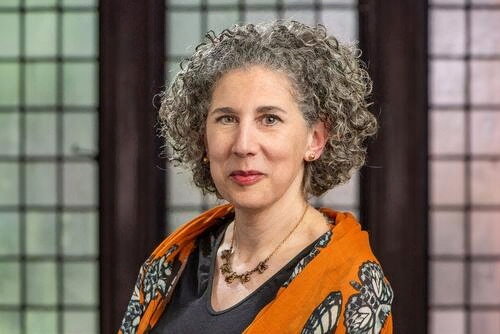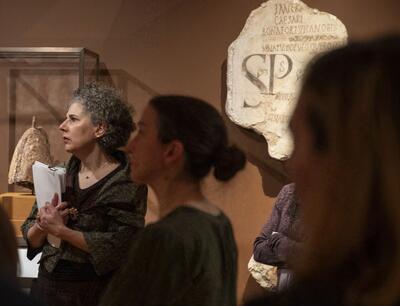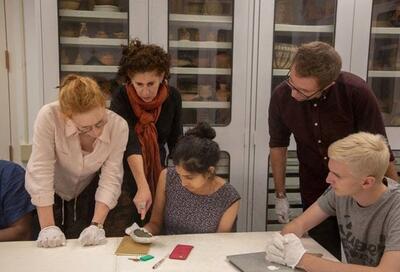By Ray Waddle
For Laura Nasrallah, an early childhood in Lebanon—the most religiously diverse nation in the Middle East—turned out to be extraordinary preparation for a life as a historian, biblical scholar, and interpreter of the contemporary power and violence of religion.
Born in the U.S., she was an infant when she moved to Beirut with her American mother and Lebanese father. In 1976, when Nasrallah was six years old, she and her family were evacuated from the country at the start of the civil war, a conflict fueled by Christian-Muslim hostilities. A fluid sense of past and present—antiquity and modernity turbulently intertwined—shapes her teaching and research. Since 2019, she has been Buckingham Professor of New Testament Criticism and Interpretation at Yale.
 “I’m trying to encourage my students to be historians. That might sound like an old, dusty word, but what I’m aiming for is to say if we don’t know history then we can’t think ethically,” she said in a recent interview.
“I’m trying to encourage my students to be historians. That might sound like an old, dusty word, but what I’m aiming for is to say if we don’t know history then we can’t think ethically,” she said in a recent interview.
“More and more I want to help them make connections between analyses of power and religious complexity and race and ethnicity in the ancient world and today. Ancient historical materials are laboratories for considering ethics, economics, power.”
A contested story
Nasrallah makes this point whether teaching in a classroom on the Quad or at an archaeological site in Corinth: the past is not an untouchable museum artifact but an often bewildering and contested story to tell, with moral consequences for the future. The politics of scholarship, the ethics of exegesis, the truths of history—the dust is never settled.
“When we’re visiting Athens or Ephesus or other sites of antiquity, the first goal is to think deeply about the ways history is represented,” she said. “An archaeological site is not an objective account of what happened. It is curated by various archaeologists who think it’s worth showing one time period, digging down and destroying the rest of the layers, worth showing certain monumental buildings or finding objects to place behind glass. Historians today are raising new questions, shifting away from the ‘monumental’ and from the ‘great man’ narrative of history. We can go to those sites and see a great bath and ask: Who fueled the fire for the bath? What wood was taken under what conditions of deforestation? What does empire do to a landscape? What does empire do to the bodies of enslaved people?”
Such deliberations can inspire awareness of the slant of ethical choices in life even now—the racial priorities of public policy, the political decisions that can determine the destiny of a city, ruin neighborhoods, or devalue entire groups of people. The ethics underlying the study of history reverberate daily, she said.
“In the classroom, I want us to think about the way we are woven into larger processes. Whether I introduce students to a Christian text or a contemporary scholar, or tell them my own syllabus is never objective but is my own curation, I hope they’ll ask questions or push back.”
Students as future colleagues and lifelong scholars
With a joint appointment at Yale’s Department of Religious Studies, Nasrallah regards students as future colleagues who are invited to join the adventure of biblical interpretation, claim their own insights, and eventually share them with their own stakeholders or publics.
“I present to them a range of scholarly voices so they will think of themselves as life-long scholars once they leave here—not just as people who are going to become exhausted serving their various religious communities or pursuing doctoral work! I hope they’ll see themselves as people who deserve to be called scholars and who’ll carve out time to wrestle with these texts in order to serve those to whom they’re called. The Greek term scholē means leisure or rest—it’s something usually reserved for the elite of the ancient world. I want us all to have that ability to create and to find rest, time for the mind and spirit’s explorations.”
A key to sustaining such curiosity is to stay alert to the intrigue or strangeness of ancient writings, she suggested. In her New Testament classes, students learn to adopt a respectful stance of “listening” to the texts by undertaking close readings and unearthing their own unexpected responses, as well as reading against the grain to try to reconstruct something about those whom ancient texts often marginalize—women, the enslaved, those of low status.
 “Often what we’ll notice first is how strange even a familiar text is, how different it is from what we thought. And if at that point a student inclination is to use words like grace or theology or salvation when those words aren’t in the text itself, I discourage that terminology. I invite them to be curious about what they’re reading, be baffled by it. That ethical position of respectful listening is a skill to bring into play every day, something to take to our own face-to-face relationships in the present. That doesn’t mean students aren’t frustrated with me at times—for example, if they talk about the letters of Paul being Christian, I’ll ask, Why would you say they’re Christian when that word did not yet exist? Why use that word? How do you argue for its appropriateness here? That drives some people crazy!”
“Often what we’ll notice first is how strange even a familiar text is, how different it is from what we thought. And if at that point a student inclination is to use words like grace or theology or salvation when those words aren’t in the text itself, I discourage that terminology. I invite them to be curious about what they’re reading, be baffled by it. That ethical position of respectful listening is a skill to bring into play every day, something to take to our own face-to-face relationships in the present. That doesn’t mean students aren’t frustrated with me at times—for example, if they talk about the letters of Paul being Christian, I’ll ask, Why would you say they’re Christian when that word did not yet exist? Why use that word? How do you argue for its appropriateness here? That drives some people crazy!”
From Beirut to Atlanta
After the upheaval of evacuation from Beirut, Nasrallah and family, who identify as Protestant, moved to Atlanta, where she attended a Southern Baptist grade school. Her Protestant identity goes back several generations on her father’s side in modern Lebanese history. The work of her great-grandmother Masihiyya as a Bible teacher in the region after the First World War was featured in the 2019 book Protestants, Gender and the Arab Renaissance of Late Ottoman Syria by Deanna Ferree Womack of Emory University. Nasrallah’s cousin the Rev. Dr. Rima Nasrallah van Saane is a scholar of religion at the Near East School of Theology in Beirut. Nasrallah received a B.A. in English literature from Princeton, then turned decisively to the study of religion, earning M.Div. and Th.D. degrees from Harvard Divinity School.
In her two decades of teaching (first at Occidental College, then at Harvard Divinity School and now Yale), Nasrallah has seen the academic study of religion do much soul-searching about its place in university life, adjust to the decline of some faith institutions in the U.S. and Europe, respond to global cataclysms, and embrace new energies of diversity. She does not shy away from assessing the perennial tensions between institutional prerogatives and the vitalities embodied by new generations. Religion is “effervescing everywhere around us,” whether cautious religious bureaucracies are ready or not, she said.
“The challenge for us is to grasp how our students are shifting with more nimbleness than we, in the traditional structures of divinity schools, toward the multi-sited religiousness of the world. We find expressions of religion all over the place, whether in a storefront church ministry or a chaplaincy within a business. Students bring an on-the-ground wisdom about the locations they come from and the places they envision going to.
“I wish we were more forward-thinking in theological education about what our students are going to need in the next generation, and I wish we could see how religion is effervescing beyond mainline Protestantism. That’s the complicated question: Are our institutions willing to do that? In some ways it’s good to be institutionally conservative in that you don’t upend the university, sell all the buildings, and go instantly online, but in other ways it’s very dangerous because you have a vision that is decades behind what is happening and doesn’t embrace the innovations of the moment.”
Besides her joint appointment in Religious Studies, Nasrallah has secondary appointments in the Yale Women’s, Gender, and Sexuality Studies program and in Yale’s Department of Classics. She is the author of Archaeology and the Letters of Paul (Oxford, 2019) and other books. Her latest, Ancient Christians and the Power of Curses: Magic, Aesthetics, and Justice, will be released this spring by Cambridge University Press.
‘Vanguard of imagining’
This semester she is also co-teaching a course on Greco-Roman religions with Princeton professor AnneMarie Luijendijk, focusing on ancient Dura-Europos, a site in modern Syria first unearthed in the 1920s with assistance from Yale archaeologists, and Antioch on the Orontes, a site in modern Turkey excavated in the 1930s by a team from Princeton. Yale and Princeton students travel to each other’s campuses to study the collections of the two universities.
 Her far-flung study of antiquity reinforces her convictions about the many-layered nature of history and religion in a pluralistic world. Religion itself contains substrates shaped by the pressures of time, politics, sociology, and conflict. This is liberating news, she suggested. Each new inquiry, each new conversation, can become a practice of furthering justice, humility, repair. Theological education itself must awaken to its potential as a university’s ethical “vanguard of imagining.”
Her far-flung study of antiquity reinforces her convictions about the many-layered nature of history and religion in a pluralistic world. Religion itself contains substrates shaped by the pressures of time, politics, sociology, and conflict. This is liberating news, she suggested. Each new inquiry, each new conversation, can become a practice of furthering justice, humility, repair. Theological education itself must awaken to its potential as a university’s ethical “vanguard of imagining.”
“Sites of theological education should stop being ashamed that we do not nestle comfortably within the larger university; we should lean into our ad hoc and multiple purposes,” she wrote in Reflections journal in 2022.
“Our odd institutional sitings, often literally at the edge of campuses, give us space to think toward ‘otherwise possibilities,’ to borrow Ashon Crawley’s phrase, or to nurture a ‘radical hope’ that “offers the conditions that give rise to alternative social worlds out of which beloved communities can emerge and flourish,” to borrow from Keri Day ’04 M.A.R. (in her 2015 book Religious Resistance to Neoliberalism: Womanist and Black Feminist Perspectives). We could become a place of the ‘undercommons,’ to take a term from Fred Moten and Stefano Harney: a place where the work gets done and where revolutionary thought happens.”
Nasrallah sees this sense of dynamism and contention in her New Testament classes. Christianity is always in play with other forces, always abutting, she said: “We have Christian-Buddhists in our classrooms, students who are from Jewish families as well as Christian families, practitioners of Afro-Caribbean religions as well as the varieties of Christianity that emerge from that dialogue. Some queer or transgender students come with the understanding that the Bible can do a lot of damage in communities. Many of our minoritized students know deeply how the Bible can be wielded for white supremacy.”
There is no one generic or standardized Christianity found anywhere or applicable everywhere, according to Nasrallah: “Christians and Christ followers always emerge in particular cultural contexts. Religion expressions are complex, always interwoven. I think this experience of complexity is a real growing edge that some of our students understand perhaps better than our institutions. … I believe I’m not there to give them knowledge but to co-produce it with them.”